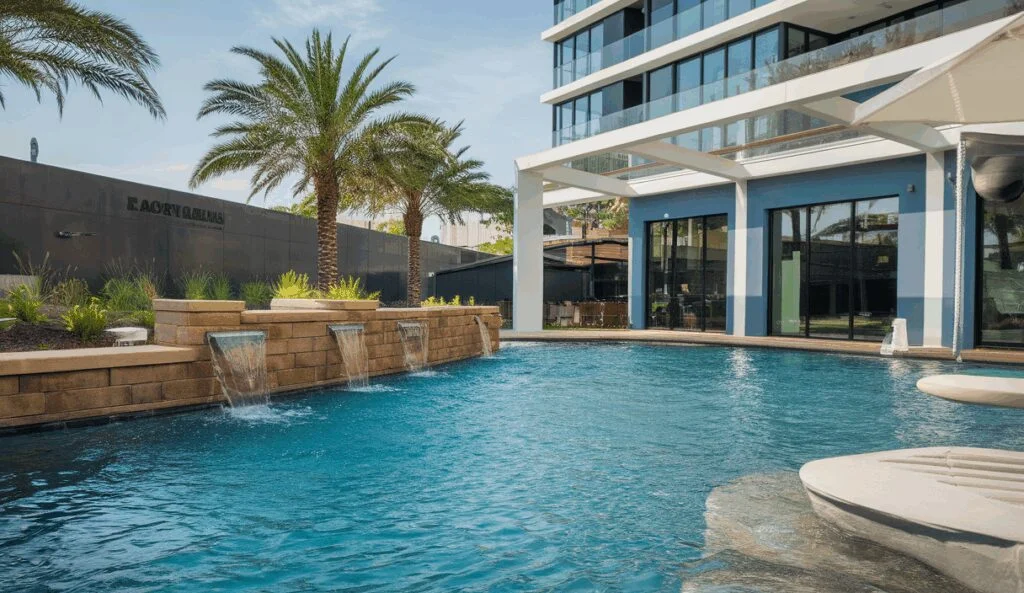You’re standing by your pool, wondering why the water doesn’t look as pristine as it should. Maybe you’ve noticed a slight cloudiness or that the water just doesn’t feel right. Pool water maintenance can be tricky, especially in the challenging Texas climate.
At Leisure Living Pools, we’ve been helping Dallas homeowners maintain sparkling clean pools for over 40 years. Our local experts understand exactly what it takes to keep pool water crystal clear and safe for your family.
Why the Water Gets Murky So Fast?
Dallas heat – it’s brutal, right? When the thermometer hits ninety-plus, people flood their yards with private lakes. All that swimming means more sweat, more skin flakes, and more sunscreen leaching into the water.
Dust from dry roads, fallen oak leaves, and city pollen drift in too. The sun helps by making water evaporate fast, concentrating dissolved substances and creating a cloudy appearance. A pool isn’t just a water tub; it’s a delicate ecosystem needing constant attention.
How the Cleaning Process Actually Works?
The trick is to think of cleaning as three interconnected steps:
- Mechanical filtration – the filter catches visible particles.
- Chemical treatment – chlorine or sanitizers kill invisible contaminants.
- Regular upkeep – skimming debris, brushing walls, and testing water.
If any one of these fails, the entire system becomes unstable. It’s like a basketball team – you need a good guard, a solid scorer, and a coach watching the clock.
Getting the Chemistry Right
The real secret is maintaining precise chemical balance. A pH between 7.2 and 7.6 allows chlorine to work effectively without damaging pool components. Chlorine levels should remain around 1-3 ppm to prevent algae growth and eye irritation.
Smart pool owners in Dallas, TX like those at Leisure Living Pools recommend testing water every week or two. You can use affordable test strip kits or consult a local pool professional for precise measurements.
You May Be Interested In: How Much Does An Inground Swimming Pool Cost in DFW?
Choosing a Filter
Dallas pool owners typically choose from three main filter types:
- Sand filter – affordable, easy to clean, catches particles around 30 µm.
- Cartridge filter – mid-range price, captures tighter particles (12 µm).
- Diatomaceous-earth (DE) filter – most expensive, traps tiny 2-5 µm particles.
Select a filter based on pool size, usage frequency, and local environmental conditions.
Professional Service vs. DIY
DIY pool maintenance can save money but requires complete responsibility. Professional services offer expertise in early problem detection and precise chemical management.
During peak summer months in Dallas, top pool service companies book quickly. Consider scheduling maintenance as early as March to secure a reliable service plan.
Common Pool Owner Mistakes
Frequent blunders include skipping weekly cleaning, improperly storing chemicals, neglecting filter maintenance, and delaying pH corrections. These shortcuts ultimately lead to more expensive repairs and intensive cleaning.
Bottom Line
Successful pool maintenance involves understanding dirt sources, maintaining chemical balance, selecting appropriate filtration, and making informed service decisions. With discipline, your backyard can become a refreshing oasis during hot Texas summers.
Clean pool water isn’t just about appearance – it’s about creating a safe, enjoyable swimming experience. Whether you’re a new pool owner or have years of experience, understanding water maintenance is crucial. At Leisure Living Pools, we’re committed to helping Dallas homeowners enjoy their pools to the fullest.
Our decades of experience mean we’ve seen every water maintenance challenge and know exactly how to solve them. Call us today for a comprehensive pool water analysis and let us help you create the perfect swimming environment.


